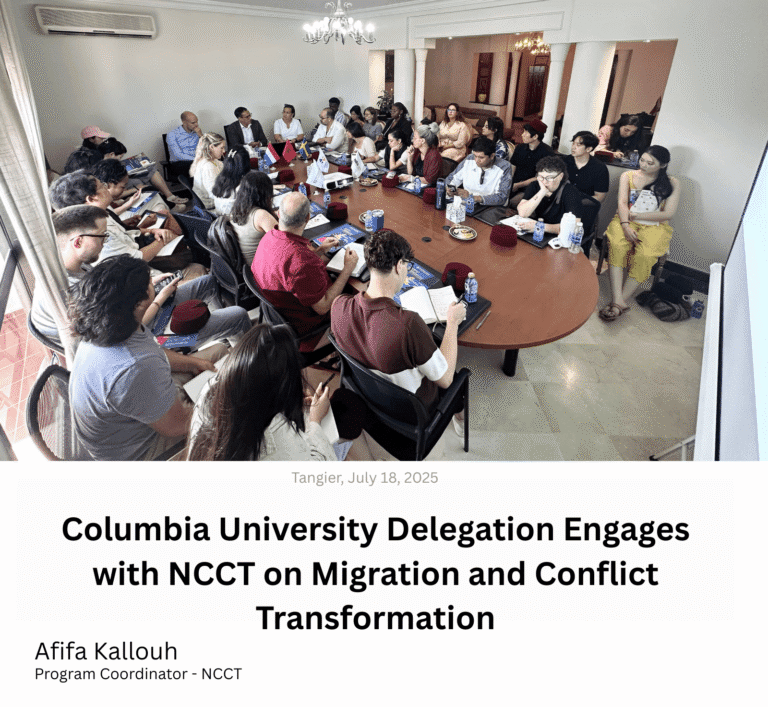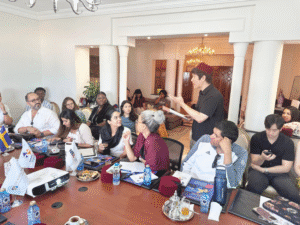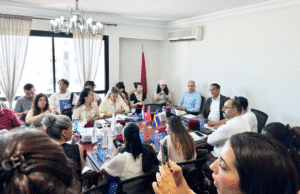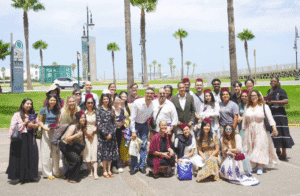

On July 18, 2025, the Nordic Center for Conflict Transformation (NCCT) hosted a delegation from Teachers College, Columbia University, at its regional office in Tangier, Morocco. The group consisted of 25 graduate students enrolled in the course “Education, Refugee & Migration Policies & Practices in Morocco,” led by Dr. Mary Mendenhall. They were accompanied by Amine Mechaal, Executive Director of Global Engagement at Teachers College, and representatives from IES Abroad Rabat, including its Director, Oussama El Addouli, and members of his team. The visit aimed to provide students with a deeper understanding of NCCT’s approach to migration and conflict transformation, while also offering insight into the perspective of one of its key partners. The session featured presentations by Noufal Abboud, NCCT’s Executive Director, and Ernest Schutte, First Secretary for Political Affairs at the Embassy of the Kingdom of the Netherlands in Morocco.
The session unfolded as a two-way exchange, beginning with a request from Mr. Abboud for students to share the questions they hoped to explore during the visit. These included inquiries about education policy, asylum systems, migration governance, and peacebuilding practices. In response, Mr. Abboud presented an overview of NCCT’s approach by linking theoretical frameworks in conflict transformation to the organization’s field practices and evidence-based methods. He also offered a critical reading of the international peacebuilding field by reflecting on its potential, impact, and shortcomings, and weighing what has worked in practice against what still demands rethinking.
Mr. Abboud drew attention to one of the often-overlooked intersections between migration and extremism by citing the case of individuals who had left for conflict zones and who self-identified using the Arabic term Al Mouhajiroun – meaning in English “Emigrants.” In that sense, he encouraged the development of alternative narratives that support constructive engagement and conflict transformation on an individual rather than collective basis. He further illustrated this through examples drawn from NCCT’s work, such as the Oum Action and ReOrient projects, which focus on prevention, rehabilitation, and reintegration strategies in Morocco.
This work is complemented by NCCT’s collaboration with Al Wassit (the Moroccan Ombudsman), within its project Action Al-Wassit, funded by the National Endowment for Democracy (NED), which plays a critical role in strengthening the relationship between public administration and its users – citizens and non-citizens alike. The Ombudsman’s mandate is not based on nationality but rather on the right to access and use public services, including by migrants. This inclusive and progressive approach reflects a deep-rooted tradition in Morocco, embedded in the historical role of the Sultan as mediator between the state and society. These efforts, he noted, should be situated within broader regional dynamics, including the African Union’s Agenda 2063, Morocco’s Atlantic Initiative, and the country’s positioning in the Sahel.
Mr. Schutte offered a diplomatic perspective on the Netherlands’ longstanding engagement with Morocco, particularly in the area of migration. He discussed the historical background of labor migration agreements that began in the 1960s, which contributed to the formation of a Moroccan diaspora now numbering over 400,000 individuals in the Netherlands, making it the country’s second-largest minority. Moreover, he highlighted the generally positive perception of migrants within Dutch society, while also addressing questions raised by students regarding asylum processes, legal pathways, and policy developments in the broader European context. He reflected on how this historical and contemporary relationship continues to shape Dutch foreign policy and informs cooperation between the Netherlands and Morocco.
 In this way, the visit served as a platform for exchange and reflection on how theoretical inquiry meets field practice, and it gave students an opportunity to explore complex and evolving questions at the intersection of migration and conflict transformation.
In this way, the visit served as a platform for exchange and reflection on how theoretical inquiry meets field practice, and it gave students an opportunity to explore complex and evolving questions at the intersection of migration and conflict transformation.